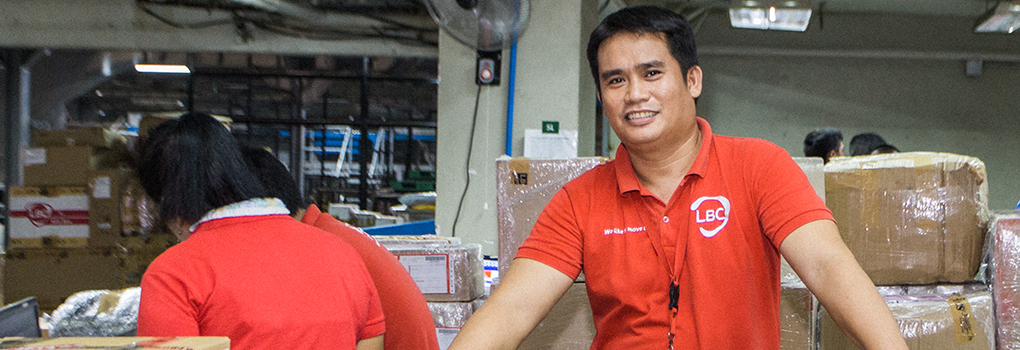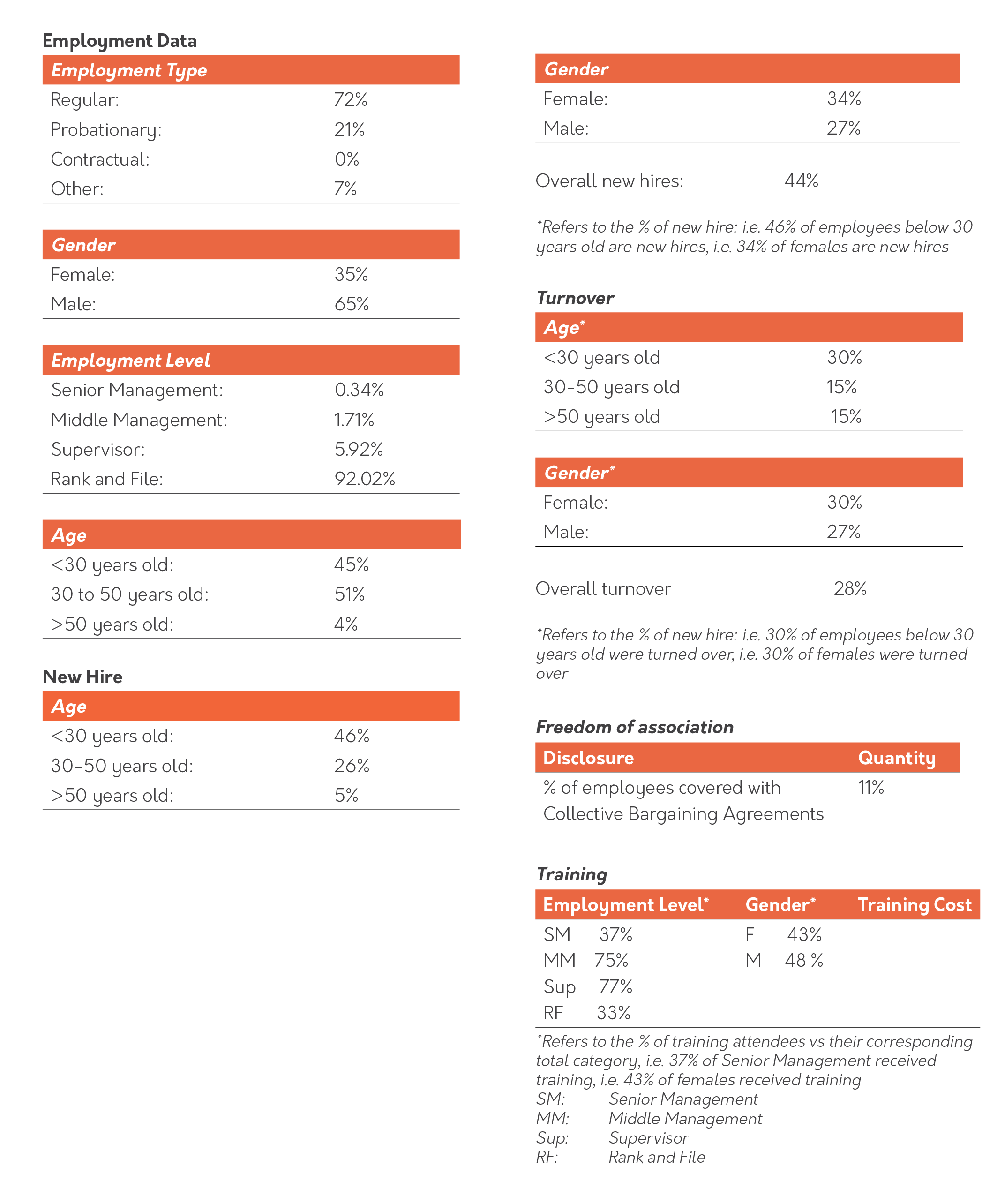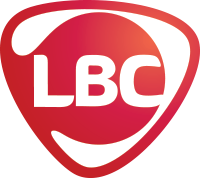Social

Our social commitment begins with our responsibility in taking care of our employees and our brand’s promise to our customers and extends to the improvement of lives of our Foundation’s beneficiaries. Our actions help to achieve the following SDGs: Good health and well-being (SDG 3), Quality education (SDG 4), Gender Equality (SDG 5); Decent work and economic growth (SDG 8), and Industry, innovation and infrastructure (SDG 9).

Employee Management
Our impact
Expanding from local to global, we depend on our employees to ensure quality and excellence throughout this crucial period of growth. In our view, we can only fully optimize our investments in technological advancements with an engaged and skilled workforce. As such, a key area for us is employee development—one that will enable our people to develop their skills, increase their productivity, and improve their lives in line with our growth.
Key highlights of our employment data include:
- Gender diversity split at 35% female and 65% male;
- New hire rate at 44%; and
- Turnover rate at 28%
Our management approach
To support full, productive employment and decent work for all and to promote lifelong learning opportunities, we invest in personnel development programs and learning management systems. This includes e-Learning, Development Programs for Supervisors, Service Excellence Program, and a Career Development and Succession Planning initiative, among others. We have also started a Competency-based System to ensure effective performance of all functions and responsibilities regardless of position and to help identify and address employee development needs together with their supervisors.
Every year, we perform an assessment called the Leadership Practices Inventory to study and enhance the leadership behavior of supervisors to top management. In 2018, we trained and evaluated 592 leaders and offered training programs to 9,518 employees (of which 39% joined trainings on Compliance, Leadership, Functional/Technical, and 61% attended Customer Service Trainings/Service Excellence Program).
Additionally, we conduct Values Validation Survey and an Employee Engagement Survey annually to ensure that each employee demonstrates and embodies our mission and core values. With 100% employees surveyed, the result of the organization-wide Employee Survey (2018) revealed employee engagement score of 4.06 out of 5 and satisfaction score of 80%; willingness to promote LBC as an employer at 84.5%, and happiness at work at 84.5%. For the Values Validation Ratings, the survey showed that all values have improved over the last three years (2015-2018), with an overall rating of 3.57 from 2015 to 3.69 in 2018.
Our risks and opportunities
Our success depends in large part on our ability to maintain a productive workforce. That’s why we ensure that our labor rules and regulations and government-mandated benefits are compliant with national laws. Plus, we maintain good relations with our employees and workers, whether under collective bargaining agreements or not. This is evident with the number of employees staying with the company for 20 to more than 30 years. Although we have not experienced any disruptive labor disputes in the recent past, any strikes, work stoppages, grievances, complaints, or claims of unfair practices, a deterioration in our employee relations could result in failure to meet or fulfill obligations to our customers.
A more detailed assessment of our Workplace conditions, Labor Standards, and Human Rights will be included in our next sustainability report.
Relationship with Community
Our impact
As a trusted corporate citizen, the LBC Foundation seeks to create and redistribute wealth by responding to the needs of society and working towards a sustainable form of support for the underserved Filipino.
Our management approach
LBC Foundation supports stakeholders by enriching life and culture, encouraging the development and education, and empowering those who serve the poor for nation-building. It creates maximum impact by bridging those leading change in their respective fields and fostering a partnership that benefits the organization’s stakeholders first.
In 2018, the LBC Foundation had 1,149 volunteers who rendered 3,037 volunteer hours in various programs throughout the country. They served 159 community members, built and outfitted 6 classrooms (2 in Batangas, 2 in Dumaguete, and 2 in Ifugao), donated P1 million worth of in-kind donation (about 80% on educational tools and transportation, and the remaining 20% for free cargo services to assist 20 NGOs and over 100 children supported through World Vision). The foundation also supported 230 scholars across different levels including kindergarten, elementary, and high school.
Customer Management
Our impact
We are constantly in touch with our customers. We are the warm and helpful partner who enjoys moving packages, goods and money for them. In many cases, this allows us to learn new capabilities and upgrade the total customer experience.
Our management approach
Our core service advantage stems from our product responsibility. This is because we are rightly committed to quality and customer satisfaction.
Take for example our transition from a processed-based approach towards a market relevant international standards, that is the ISO certification. In line with our thrust for growth and as part of the ISO requirements, we’ve strengthened our training and employee development programs to ensure that our teams understood its relevance to internal operations. It also sharpened our ability to deliver sound quality management principles anchored on strong customer focus, motivation, process approach, and continuous improvement and review.
Moreover, a key benefit that this progression brings is innovation—and there is evidence that our digital transformation is laying the groundwork for innovation and customer satisfaction. It helps us improve our understanding of customers’ evolving preferences and provide us with a strong foundation to envision new products and customized solutions. Our website, for instance, is no longer primarily for information only. It is now capable of online real-time transaction processing and customer service, with interactive features such as package tracking, rate calculators and scheduling of pick-ups for parcels and cargo, as well as real-time customer service support through the “Live Talk” capability. Other examples are our new online remittance service, the launch of Chatbot through our Facebook account and some unique promotional services for our fellow Filipinos abroad, including an offering we designed for Filipino workers in Hong Kong where they can store their ‘padala’ in our branch up to four months for free before sending the package to their families in the Philippines.
Still, there is of course lots to do in this area. And to get it right, we’ve developed a set of key metrics which we believe best measure our product responsibility. These are:
- on-time delivery rate;
- productivity per courier; customer care answer level;
- customer care average handling time (minutes);
- customer service total response time (minutes); and
- customer care complaint management in terms of closure rate and closure rate within 24 hours.
Our risks and opportunities
There is no business without its challenges but by embedding sustainability throughout our organization, we can continue to take care of our employees and provide exceptional service to all our stakeholders. We do that by being open to new perspectives so we can gain meaningful insight into the evolution of the modern customer and applying that intelligence to reinvent the business model.
A few of these risk factors and contingencies are the country’s IT infrastructure and changes in freight and transportation costs, which may be beyond our control. In the next sustainability report, we aim to highlight our supply chain standards, practices, and policies which are one of the material topics for the logistics industry.
